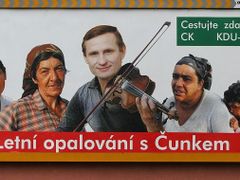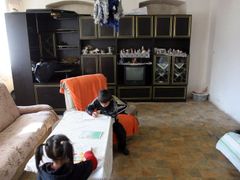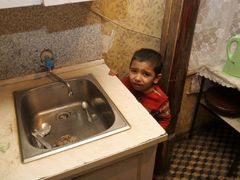Prague - Regional Development Minister Jiří Čunek, who was in the past intensly criticised for his eviction of Roma families in Vsetín, has now presented a revolutionary project to integrate the socially disadvantaged.
Čunek, leader of the Christian Democrats (KDÚ-ČSL), helped prepare a new proposal for social integration that represents a revolution in the approach towns and municipalities take to Roma ghettos.
The proposal was submitted for review to the Minister for Human Rights and National Minorities Džamila Stehlíková at a government meeting Wednesday.
As it stands, Čunek's proposed legislation would see towns receiving money for development only if they also propose and carry out solutions to solve the problem of ghettos and their inhabitants.
Financing from EU funds and national endowment programs could then be directly given to towns that have effective policies aimed at eradicating poor neighborhoods.
"The complete reworking of a municipality or town's Integrated Development Program will be one condition," said Jozef Baláž, an advisor to Čunek who helped prepare the material.
Read more: US criticizes Jiří Čunek for Roma evictions, corruption
Money instead of demands
A recent conference on social integration seemed to suggest that if it is not possible to demand that cities solve the ghetto problem, they need to be bought off. The meeting was attended by representatives from non-profit organizations and the Local Development, Education and Interior Ministries.
According to Baláž, no town has yet proved capable of dealing with the problem of neglected Roma localities. "The proposal's ambition is to prepare a simple "recipe book" for municipalities on how to approach the problem," said Baláž.
Read more: New agency to tackle Roma ghettos
A municipality would however, continue to be the main initiator in the eradication of so-called deprived territories or socially neglected localities. The proposal also points out that a municipality should create demand amongst disadvantaged citizens to encourage participation in requalification courses or integration programs, for example.
The Agency for Social Integration could then help with the timely and comprehensive coordination of such projects in Roma areas. Currently the agency only has an advisory function but holds no authority. It could help coordinate state assistance, school activities and non-profit organizations in individual towns and villages as well as contribute to the work of the police, for example.
Isn't this the Polis project?
The new proposal appears remarkably similar to the Polis project, organized by the non-profit organization People in Need. The aim of the Polis project is to combine the services of all institutions, non-profit organizations and accountable agencies in a given city.
The cities of Plzeň, Bílina and Ústí nad Labem were first to participate in the project and have reported excellent results. Marek Podlaha, director of the Agency for Social Integration, doesn't hide the inspiration the Polis project has given him in his role.
Representatives of non-profit organizations however, are not overly excited about the proposal. They say that it would be more effective if the agency encouraged changes to the laws. "We are quite closely involved at a local level," confirmed one Polis worker on the ground, who asked not to be named because of criticism.
The Union of Towns and Municipalities is unaware of the proposal. "Nevertheless, we would welcome an invitation at some point if any plan affecting towns and municipalities was being approved," said the union's Jaroslav Šolc. That has yet to happen.
Read more: Amnesty Int'l: Roma Discrimination in ČR persists
Don't expect legislation any time soon
It is still not known when the proposal will come into law. The Local Development, Education and Interior Ministries and Agency for Social Integration are now looking for an independent coordinator as well as funding.
"I am worried. It is one ministry's proposal; they must first convince the entire government," said agency director Marek Podlaha. Any potential changes would have an effect on many laws. "When and in what form the concept will be approved already depends on the political will," he added.
Next week a meeting will take place between Jiří Čunek and members of the Government Council for Roma Affairs, during which time it will be decided on how to proceed with the proposal.
According to a study by G&C, there are more than 300 socially disadvantaged localities in the Czech Republic.
Roughly 35 percent of these have emerged in the last ten years, despite two government proposals for Roma integration and the National Plan for Social Integration.












